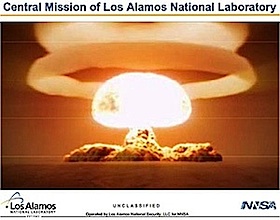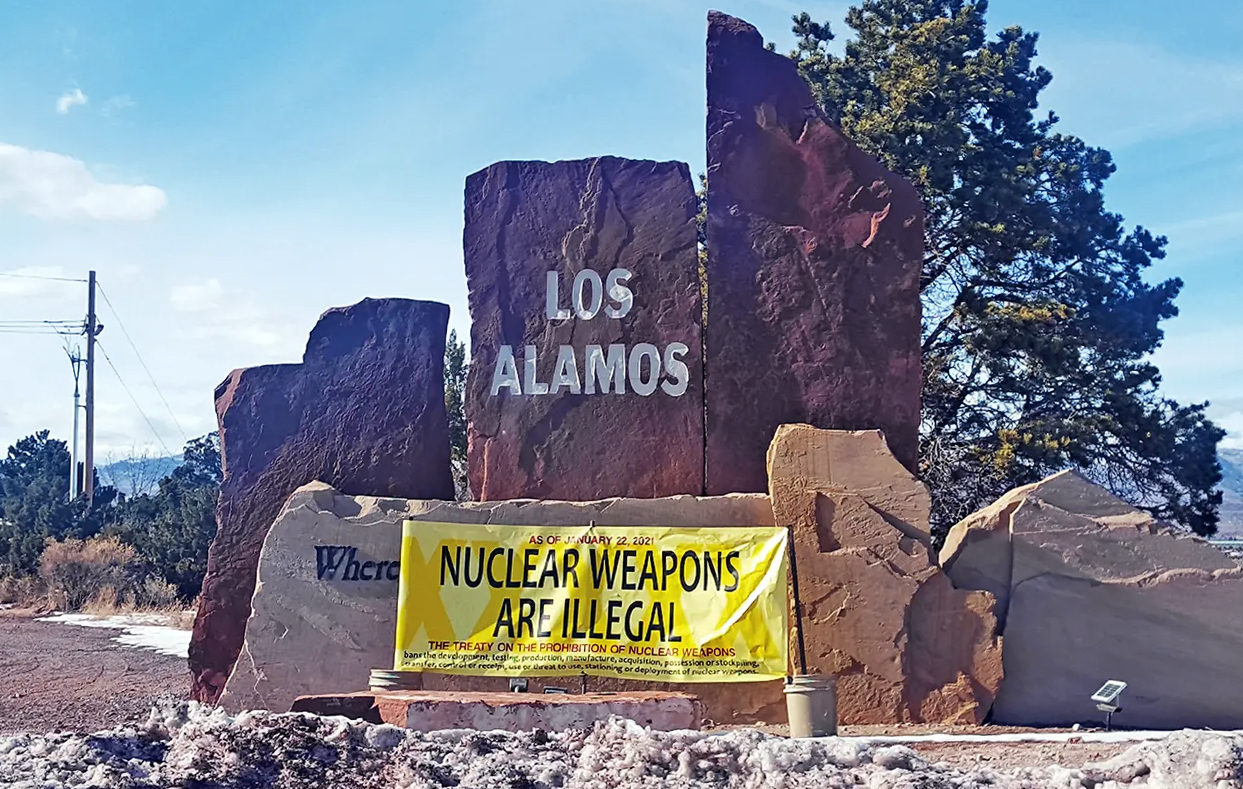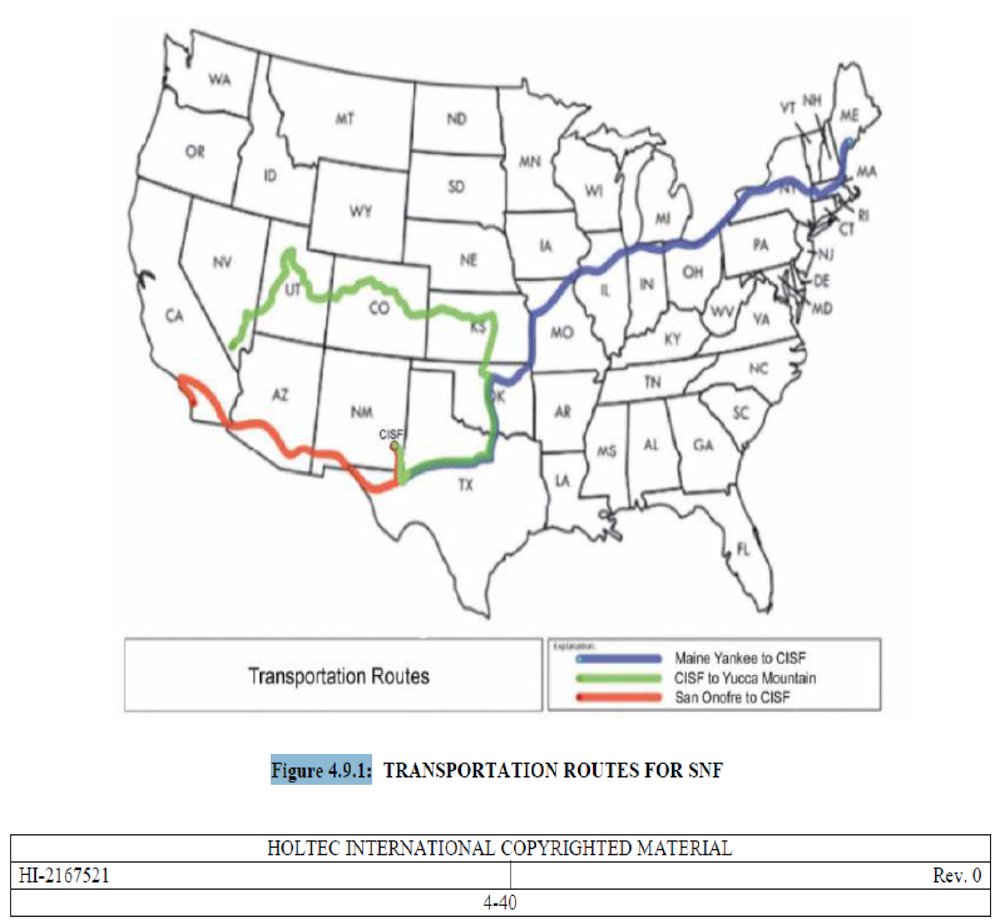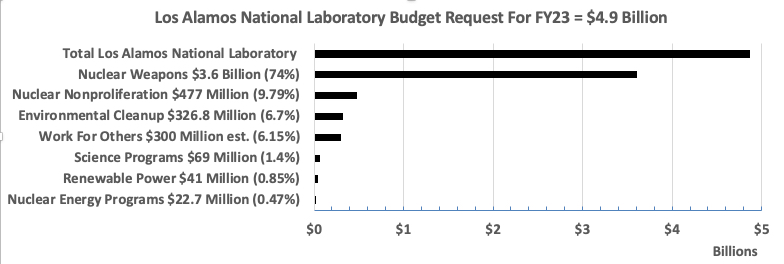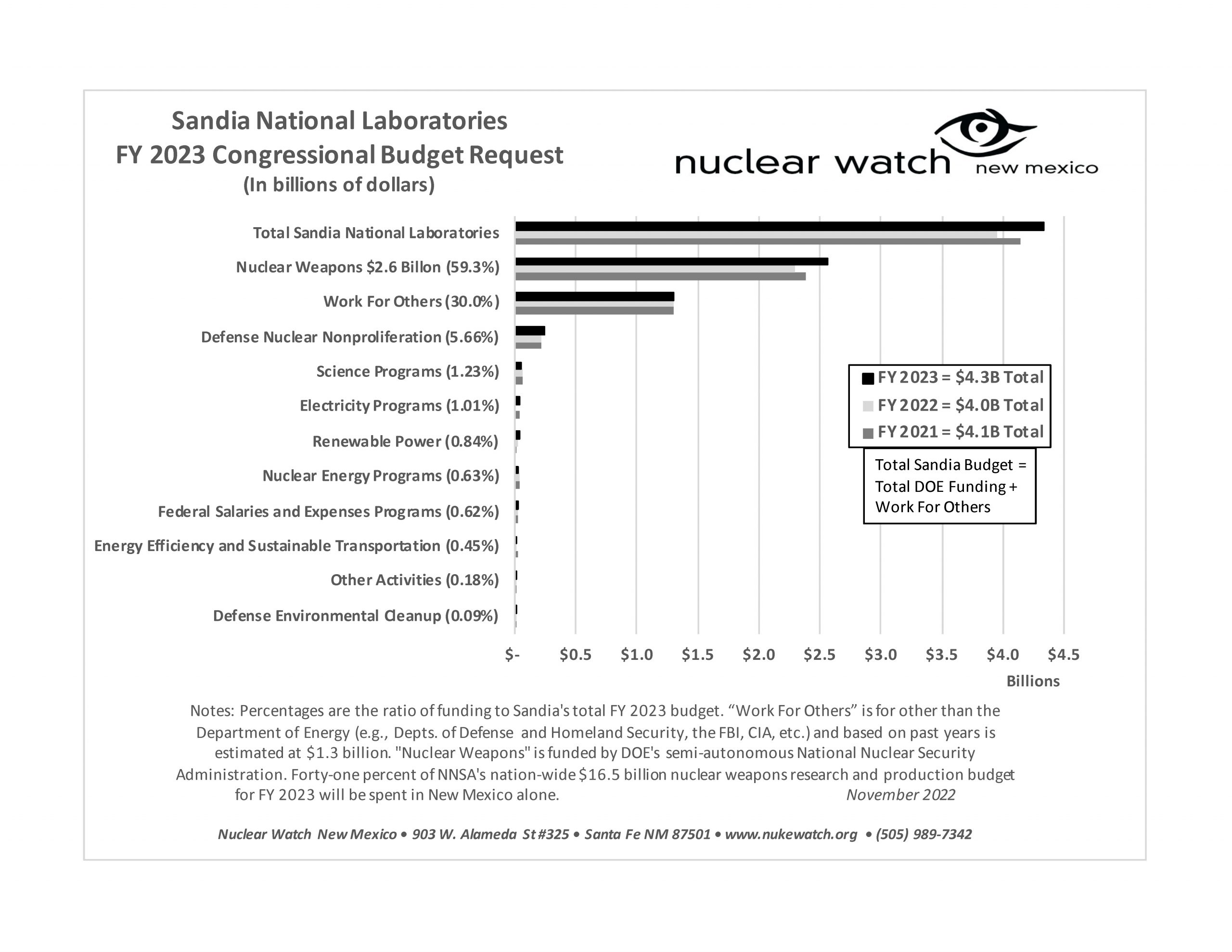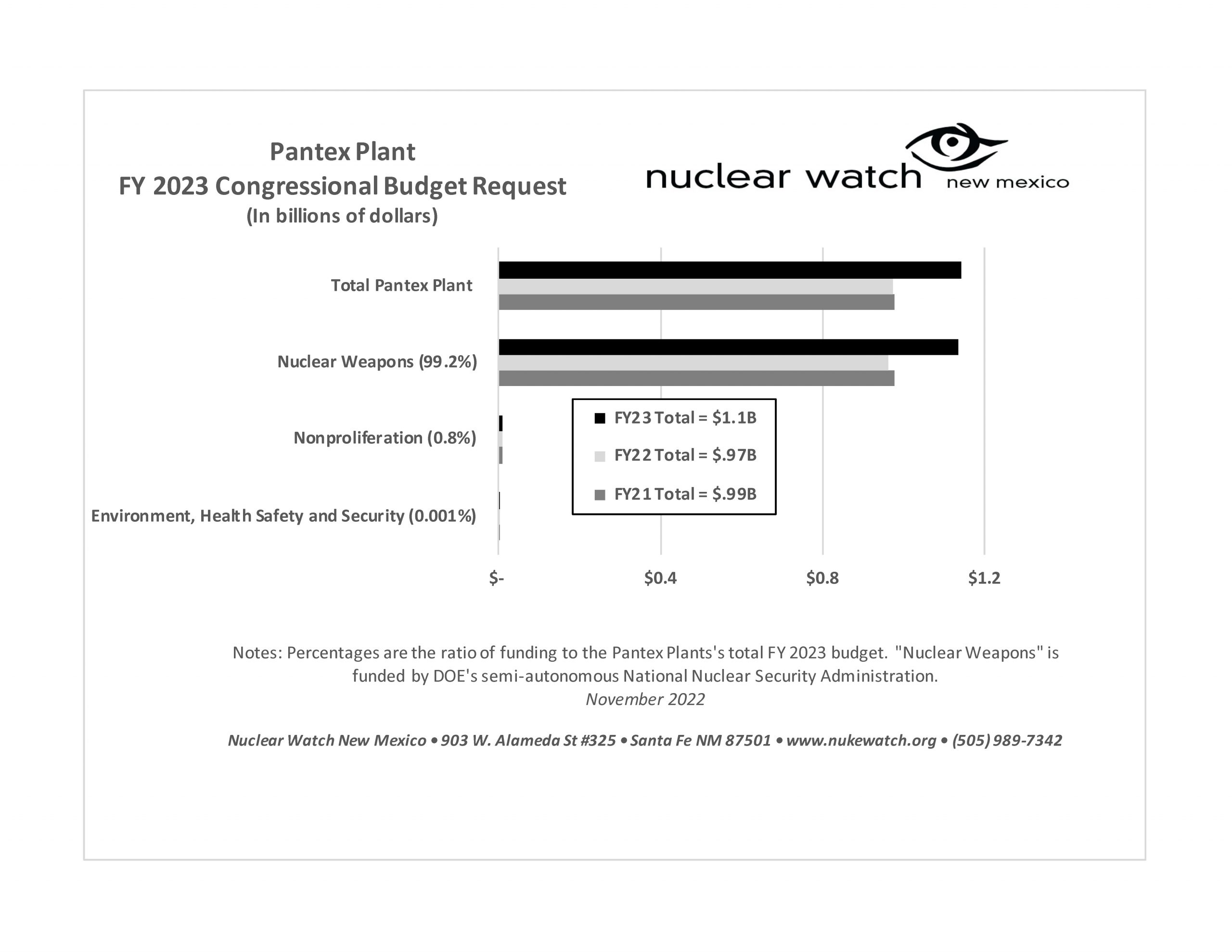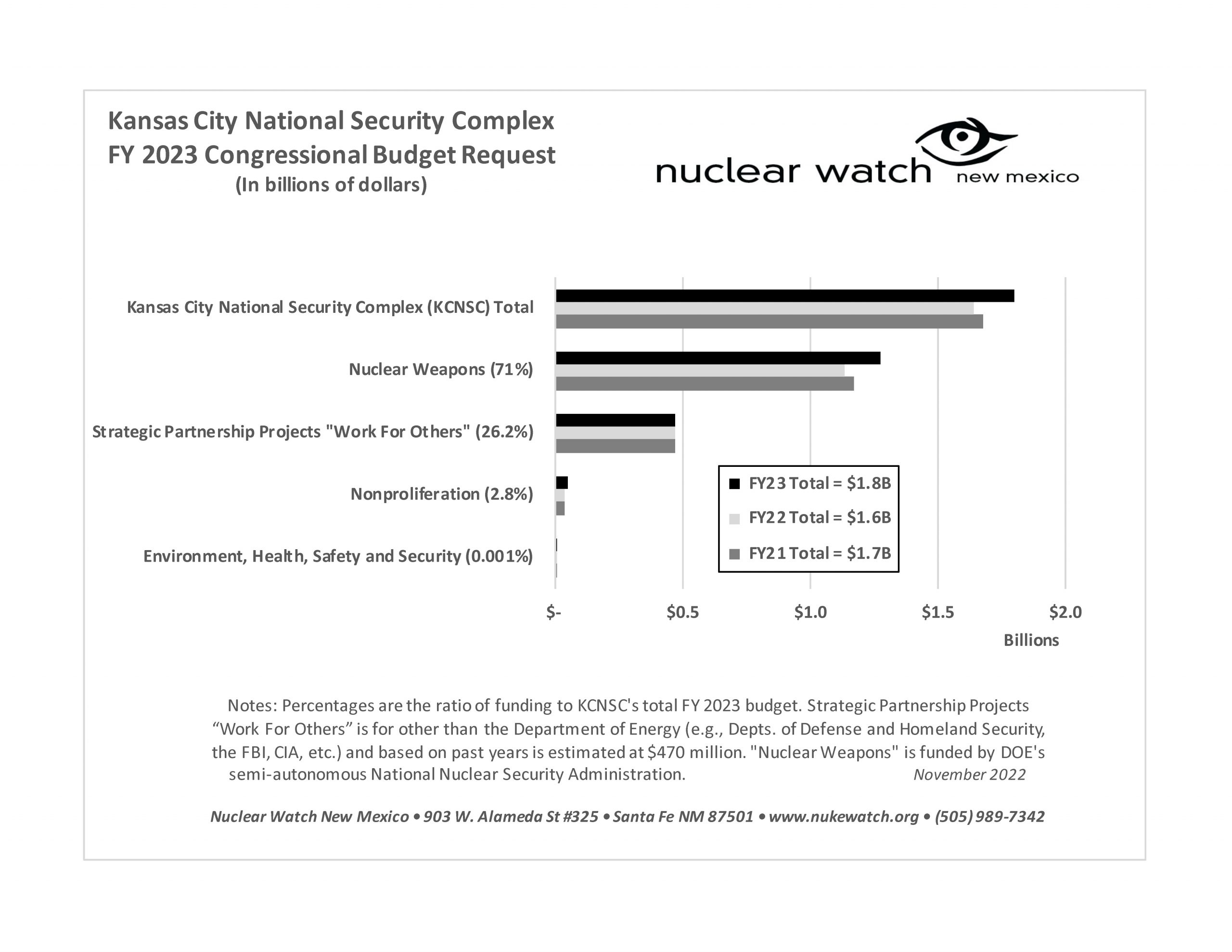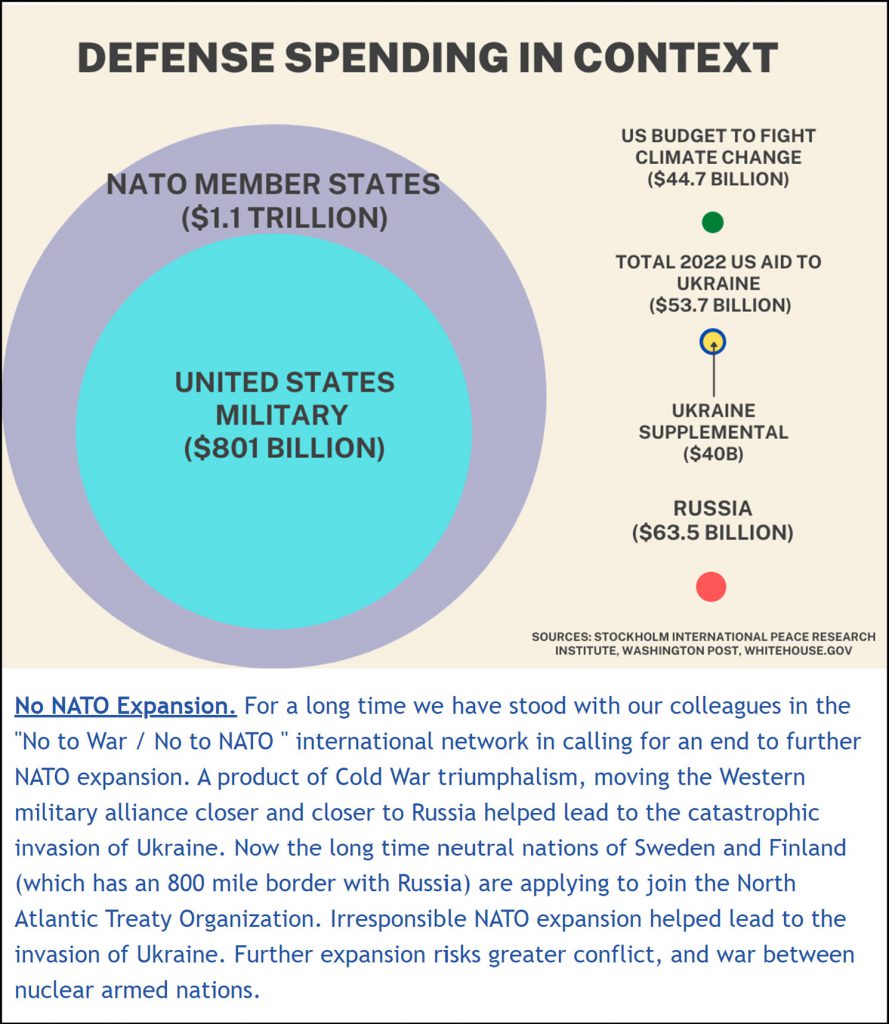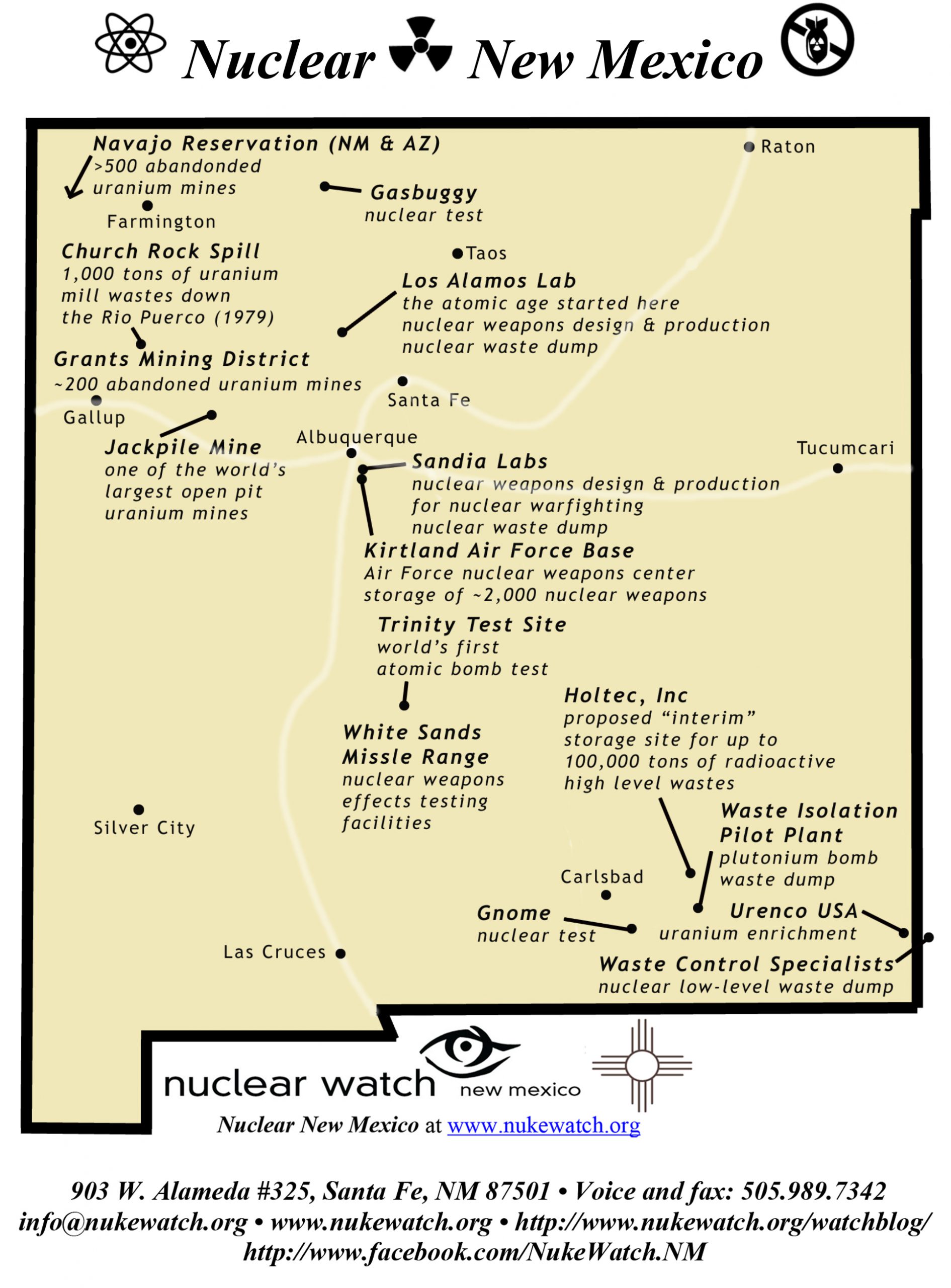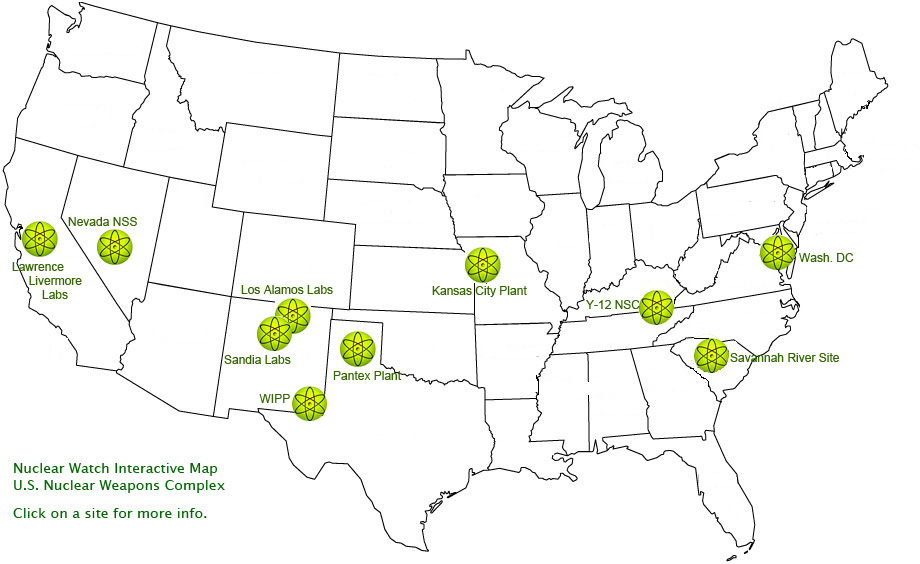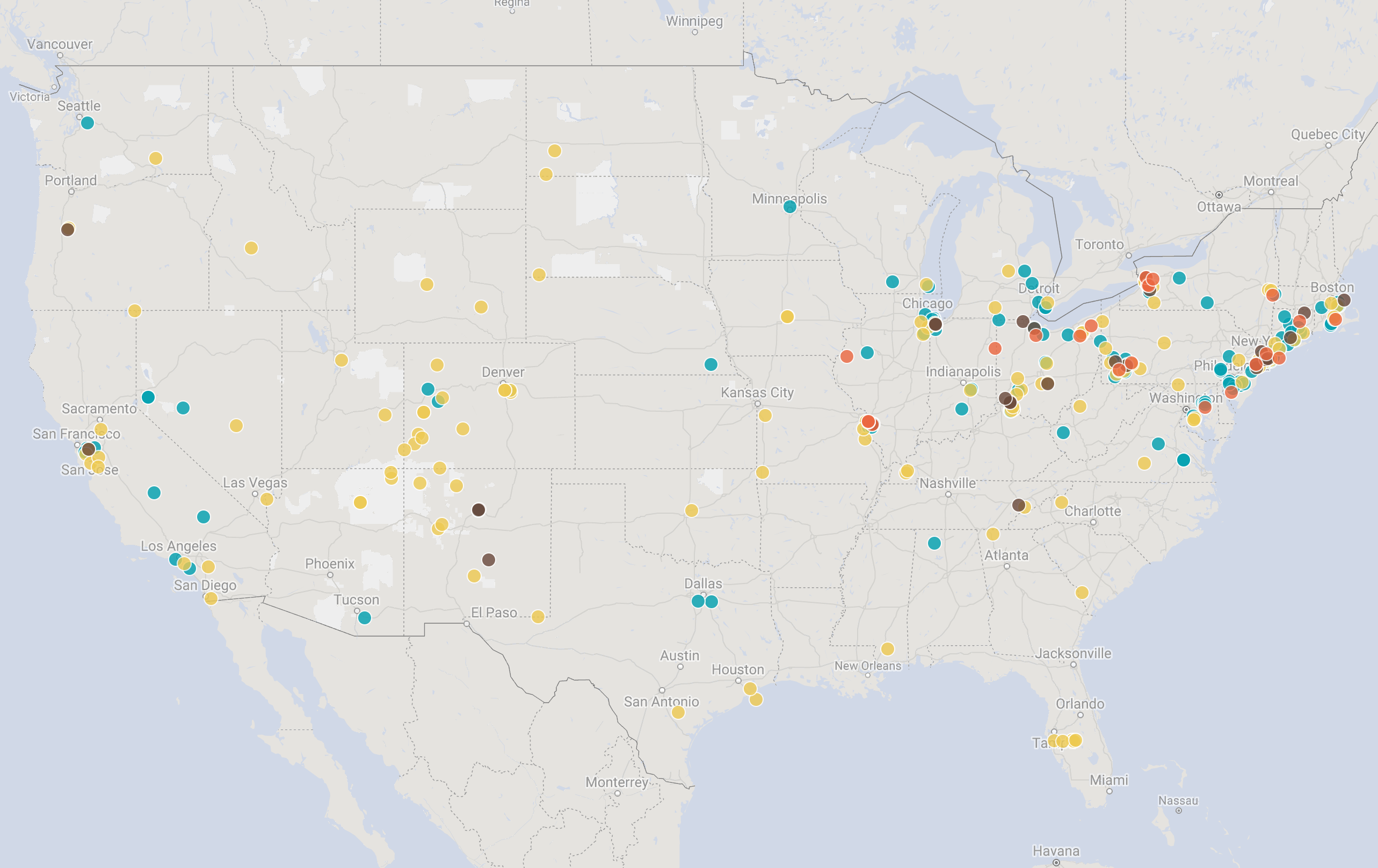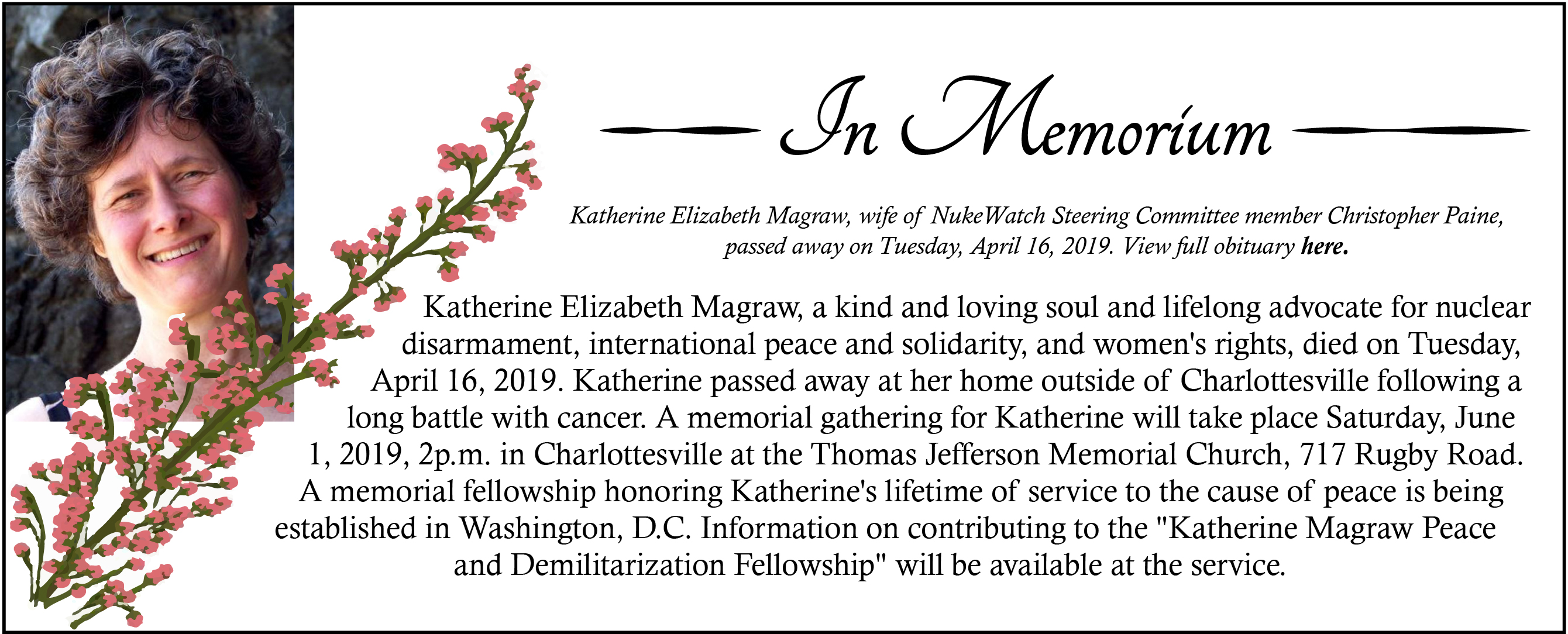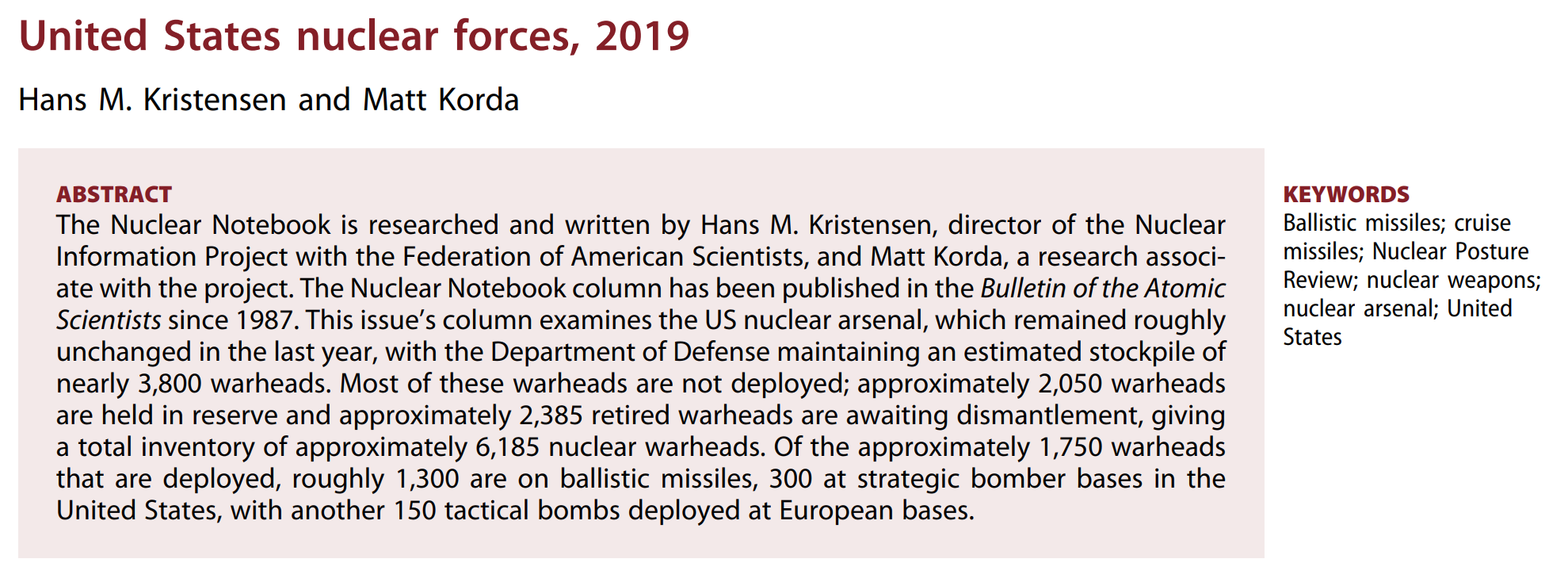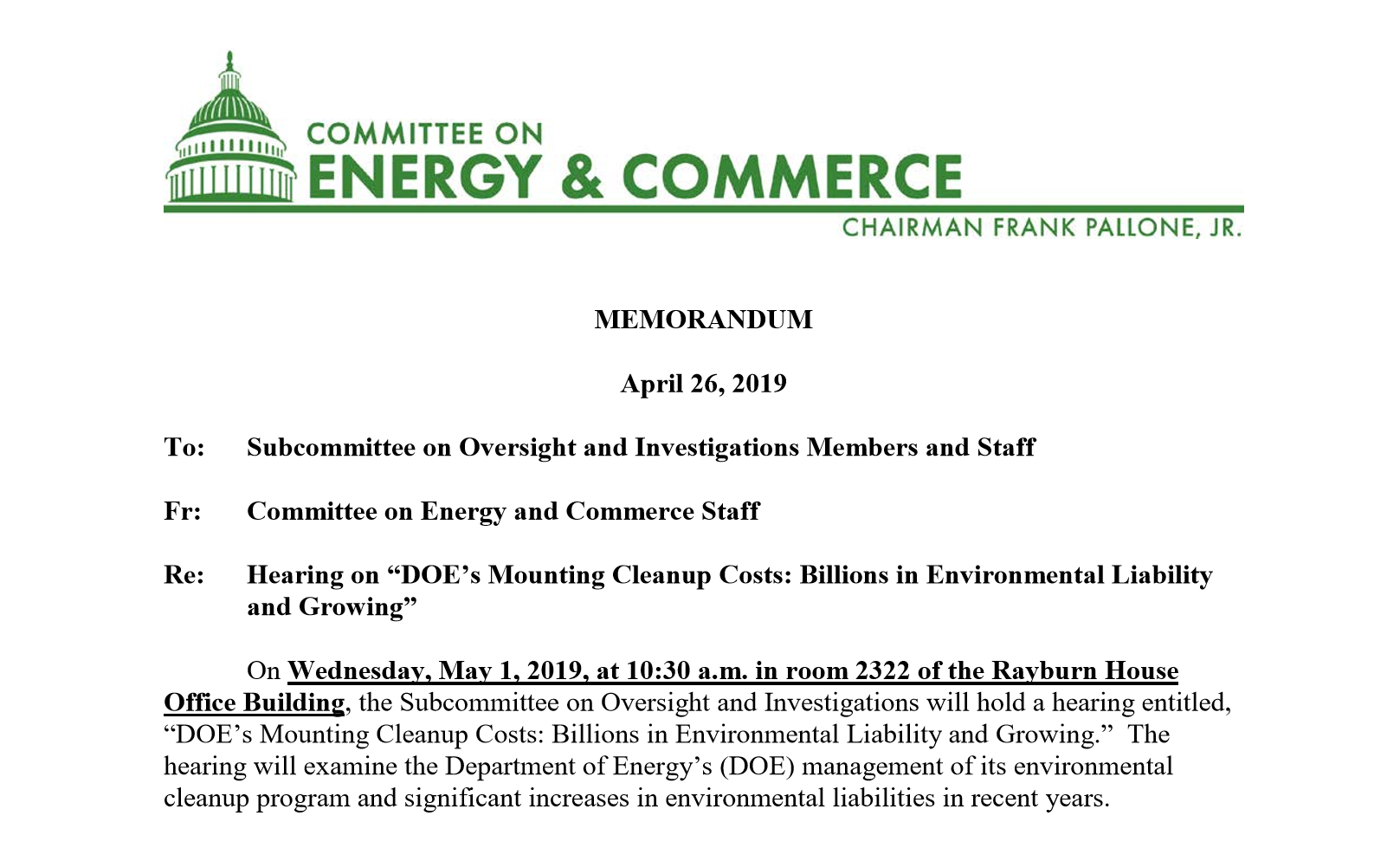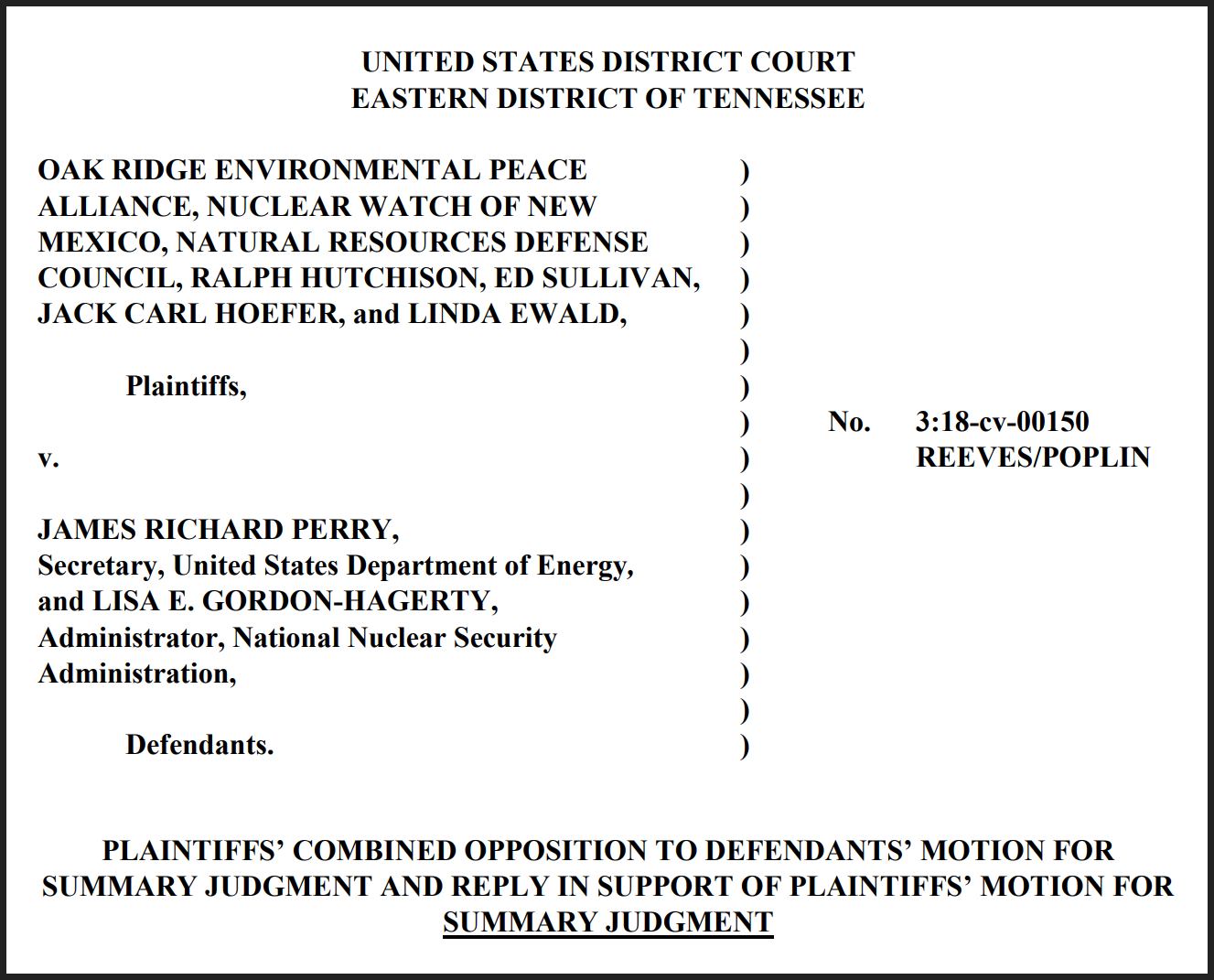QUOTE OF THE WEEK
Nothing Found
It seems we can’t find what you’re looking for. Perhaps searching can help.
LANL’s Central Mission: Los Alamos Lab officials have recently claimed that LANL has moved away from primarily nuclear weapons to “national security”, but what truly remains as the Labs central mission? Here’s the answer from one of its own documents:
LANL’s “Central Mission”- Presented at: RPI Nuclear Data 2011 Symposium for Criticality Safety and Reactor Applications (PDF) 4/27/11
Banner displaying “Nuclear Weapons Are Now Illegal” at the entrance in front of the Los Alamos National Lab to celebrate the Entry Into Force of the Nuclear Weapon Ban Treaty on January 22, 2021
Nothing Found
It seems we can’t find what you’re looking for. Perhaps searching can help.
Follow the Money!
Map of “Nuclear New Mexico”
Nuclear Watch Interactive Map – U.S. Nuclear Weapons Complex
In 1985, US President Ronald Reagan and and Russian President Mikhail Gorbachev declared that “a nuclear war cannot be won and must never be fought.”
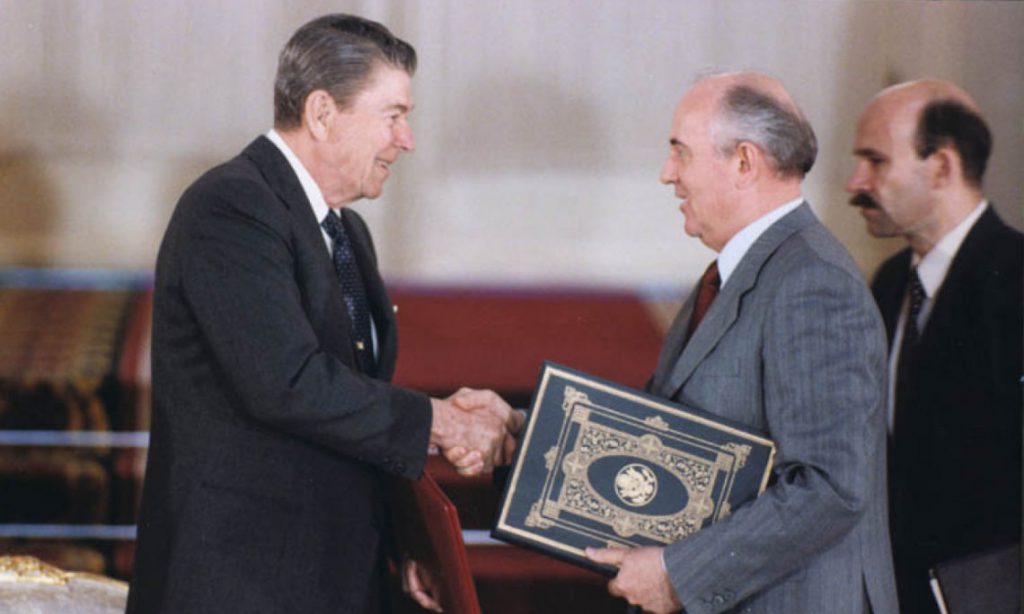
Waste Lands: America’s Forgotten Nuclear Legacy
The Wall St. Journal has compiled a searchable database of contaminated sites across the US. (view)
Related WSJ report: https://www.wsj.com
2022 BLOG POSTS
Nothing Found
It seems we can’t find what you’re looking for. Perhaps searching can help.
New & Updated
The Madness of Nuclear Deterrence
“The dangers have only become more acute in the decades since I tried to convince Thatcher.”
BY MIKHAIL GORBACHEV | wsj.com
‘Deterrence cannot protect the world from a nuclear blunder or nuclear terrorism,” George Shultz, William Perry and Sam Nunn recently wrote. “Both become more likely when there is no sustained, meaningful dialogue between Washington and Moscow.” I agree with them about the urgent need for strategic engagement between the U.S. and Russia. I am also convinced that nuclear deterrence, instead of protecting the world, is keeping it in constant jeopardy.
I asked her: “Are you really comfortable sitting on a nuclear powder keg?” I showed her a diagram representing the world’s nuclear arsenals, grouped into hundreds of squares. Each square, I told her, is enough to eliminate human civilization as we know it. I was unable to persuade Margaret Thatcher. We hear the same arguments today, including in the U.S. and Russia.
Continue reading
Hear ye, hear ye ?
The official 2019 @FAScientists US Nuclear Notebook (written by @nukestrat and yours truly) is out today in @BulletinAtomic! ??
Freely access the most up-to-date estimates of the US nuclear arsenal here:https://t.co/9HboPoKhMT pic.twitter.com/DiIAsBh5fv
— Matt Korda (@mattkorda) April 29, 2019
LANL Continues to Have Serious Nuclear Safety Management Issues
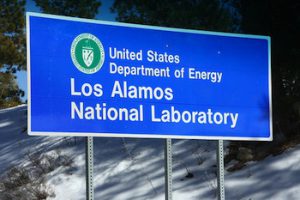
A new report illustrates why planned expanded plutonium pit production for new nuclear weapons at the Los Alamos Lab has a high probability of failure.
Shop at City of Mud and Support NukeWatch

May 4 – 5
City of Mud presents
Mom/Prom/Ban the Bomb
A two-day trunk show of
eight mighty jewelers
(and one acclaimed textile artist)
will benefit Nuclear Watch New Mexico
as they fight proliferation and pollution.
Saturday, May 4 from 11 to 6.
Sunday the 5th from 11 to 4.
1114 A Hickox St, Santa Fe, NM 87505
Report: LANL Nuclear Safety Falls Short
This article illustrates why planned expanded plutonium pit production for new nuclear weapons at the Los Alamos Lab has a high probability of failure.
Los Alamos National Laboratory is again facing criticism for failing to ensure nuclear safety in its operations, this time from a U.S. Department of Energy assessment office. (AP Photo/Albuquerque Journal)BY MARK OSWALD | abqjournal.com
SANTA FE – The U.S. Department of Energy has again found that Los Alamos National Laboratory falls short in ensuring nuclear safety in its operations, even as the lab moves toward a major increase in plutonium work under a mandate to ramp up manufacture of the cores of nuclear weapons.
A report released Monday by a DOE assessment team provides a long list of problems in how LANL manages nuclear safety issues. It notes deficiencies by both the private consortium that managed the lab for about 12 years before losing the $2 billion-plus annual operating contract last year and as well Triad National Security LLC, which took over Nov. 1.
The report says former contractor Los Alamos National Security LLC, or LANS, allowed safety issues to fester with “significant weaknesses.”
There are “institutional behaviors that have allowed identified problems to go uncorrected, problem recurrences to be routinely accepted, and corrective actions to often be delayed for years,” according to the report DOE’s Office of Enterprise Assessments.
The safety lapses are serious enough that they could lead to another shutdown of operations at LANL’s plutonium facility, the assessment suggests.
Read the report HERE
From the report’s executive summary: Overall, this assessment identified significant weaknesses in the LANS IM [issues management] process and institutional behaviors that have allowed identified problems to go uncorrected, problem recurrences to be routinely accepted, and corrective actions to often be delayed for years.Although the assessment team did not identify any immediate threats to workers, the public, or the environment, these weaknesses in IM, if uncorrected, can allow layers of defense for nuclear safety to degrade to the extent they did leading to the pause in July 2013 of key fissile material operations in the Plutonium Facility at LANL for over four years.
“According to the Government Accountability Office (GAO), EM’s environmental liability grew by about $214 billion from fiscal years 2011 through 2018, more than doubling its cleanup liability in just six years. This dramatically outpaced the roughly $45 billion EM spent on cleanup activities during that period.”
“NukeWatch: We should be expanding cleanup programs instead of nuclear bomb production that made this mess to begin with.”
View the PDF
 Our Episode 03 doesn’t have the Night King or hordes of the undead, BUT I do get to talk with Leah Greenberg, co-founder of Indivisible and one of Time Magazine’s 100 most influential people of 2019, to discuss her journey from congressional staffer to community organizer. She talks about how the idea for a 2016 handbook ignited a progressive movement of civic engagement for everyday people. Also, Ploughshares Fund’s own Michelle Dover reflects on the legacy of Indiana Senator Richard Lugar. John Carl Baker takes a closer look at the motives and intentions of Trump’s offer for arms control talks with Russia and China.
Our Episode 03 doesn’t have the Night King or hordes of the undead, BUT I do get to talk with Leah Greenberg, co-founder of Indivisible and one of Time Magazine’s 100 most influential people of 2019, to discuss her journey from congressional staffer to community organizer. She talks about how the idea for a 2016 handbook ignited a progressive movement of civic engagement for everyday people. Also, Ploughshares Fund’s own Michelle Dover reflects on the legacy of Indiana Senator Richard Lugar. John Carl Baker takes a closer look at the motives and intentions of Trump’s offer for arms control talks with Russia and China.
You can listen here: http://pressthebutton.libsyn.com/
Or – Listen and subscribe on iTunes · Spotify · SoundCloud · Google Play
DOD Official Ducks Question of Plutonium Pit Assurance if Congress Allows Only 1 Site
WASHINGTON – A senior Pentagon official declined to say here Wednesday whether he believes the Department of Energy can deliver nuclear warheads for next-generation intercontinental ballistic missiles on time if Congress does not fund both the plutonium-pit production plants the civilian agency wants to build.
“I’m aware of the issue, but I wouldn’t want to sort of step on my colleagues’ toes by addressing the details,” David Trachtenberg, deputy undersecretary of defense for policy, said following a speech at the Brookings Institution. “I’ll defer on that one, for the time being, at least.”
In an email, a spokesperson with DOE’s National Nuclear Security Administration (NNSA) said the agency “is focused on the two-site approach for plutonium pit production that was endorsed by the Nuclear Weapons Council in May 2018.”
The Donald Trump administration’s 2018 Nuclear Posture Review called on the NNSA to annually manufacture 80 pits — fissile nuclear-weapon cores — by 2030.
 In the second episode of Press The Button, the new podcast from Ploughshares Fund, Ned Price, former spokesperson for President Obama’s National Security Council and current Director of Communications and Policy with National Security Action, sits down with host Joe Cirincione. Also: this week’s nuclear news analysis with Ploughshares Fund Deputy Director of Policy Mary Kaszynski and Nuclear Field Coordinator and Senior Program Officer John Carl Baker.
In the second episode of Press The Button, the new podcast from Ploughshares Fund, Ned Price, former spokesperson for President Obama’s National Security Council and current Director of Communications and Policy with National Security Action, sits down with host Joe Cirincione. Also: this week’s nuclear news analysis with Ploughshares Fund Deputy Director of Policy Mary Kaszynski and Nuclear Field Coordinator and Senior Program Officer John Carl Baker.
You can listen here: http://pressthebutton.libsyn.com/
Or – Listen and subscribe on iTunes · Spotify · SoundCloud · Google Play
New Report Spells Out Saner Nuclear Spending Options
BY KINGSTON REIF & ALICIA SANDERS-ZAKRE | armscontrol.org
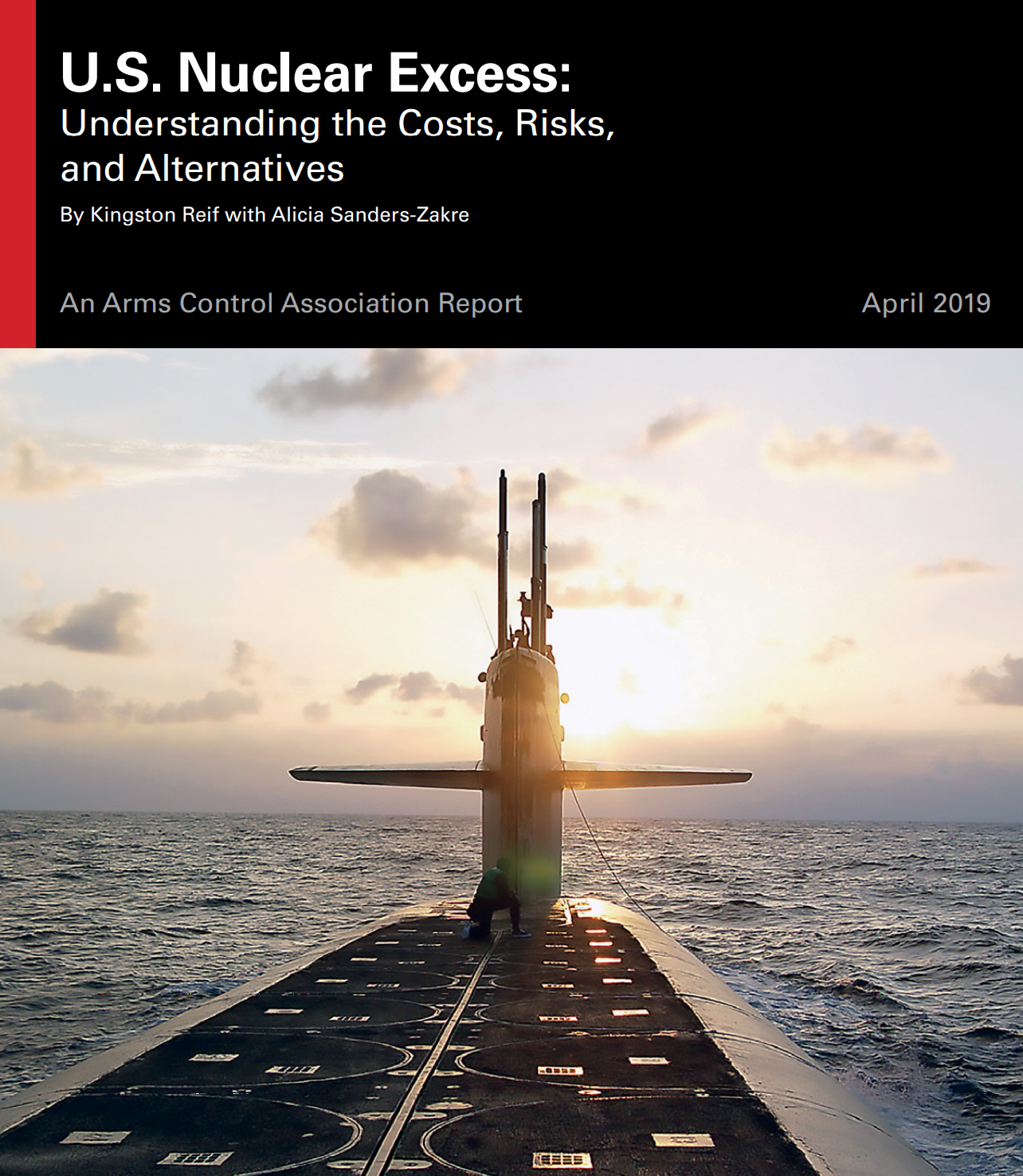 Despite characterizing during the Helsinki summit U.S. plans to replace the aging nuclear arsenal as “very, very bad policy,” the Trump administration is pursuing an excessive and unsustainable expansion of the role and capability of the U.S. nuclear arsenal to the tune of nearly $500 billion, after inflation, over the next decade. Over the next 30 years, the price tag is likely to top $1.5 trillion and could even approach $2 trillion.
Despite characterizing during the Helsinki summit U.S. plans to replace the aging nuclear arsenal as “very, very bad policy,” the Trump administration is pursuing an excessive and unsustainable expansion of the role and capability of the U.S. nuclear arsenal to the tune of nearly $500 billion, after inflation, over the next decade. Over the next 30 years, the price tag is likely to top $1.5 trillion and could even approach $2 trillion.
As our newly published report documents, it doesn’t have to be this way. U.S. Nuclear Excess: Understanding the Costs, Risks and Alternatives describes three realistic options to reduce spending on nuclear weapons and recommends steps Congress can take to adjust the programs to deal with the long-term budget challenges.
A companion website will be launched this summer, will provide regular updates on cost estimates and key decisions. The report and website were made possible with support from a project grant from the Charles Koch Foundation.
Hard duty in the Chernobyl zone
Cathie Sullivan, a New Mexico activist, worked with Chernobyl liquidator, Natalia Manzurova, during three trips to the former Soviet Union in the early 2000s. Natalia was one of 750,000 Soviet citizens sent to deal with the Chernobyl catastrophe. Natalia and Cathie together authored a short book, “Hard Duty, A woman’s experience at Chernobyl” describing Natalia’s harrowing four and a half years as a Chernobyl liquidator.
View an excerpt in this ARTICLE FROM beyondnuclearinternational.org
Feds stand by splitting ‘pit’ production between LANL, S.C.
“NNSA’s plans for expanded plutonium pit production is a house of cards waiting to fall down. First, we have an agency with a long track record of cost overruns and schedule slippages. Added to this is the lack of true mission need.
“Plutonium pit production is not being expanded to maintain stockpile safety and reliability. Instead it’s all about provocative new nuclear weapons designs that can’t be tested, or alternatively will push the U.S. back into testing with serious proliferation consequences.” – Nuclear Watch New Mexico director Jay Coghlan
BY MARK OSWALD | abqjournal.com
Lisa E. Gordon-HagertySANTA FE – Key federal agencies are standing by their plan split the work of producing the plutonium cores of nuclear weapons between Los Alamos National Laboratory and another site, a move that New Mexico’s congressional delegation continues to oppose.
But the Department of Defense and the National Nuclear Safety Administration were not unequivocal in describing the potential success of a two-site plan for making plutonium “pits.”
“Indeed, no option is without risk,” said NNSA administrator Lisa E. Gordon-Hagerty in a news release Wednesday.
The NNSA, which oversees the nation’s nuclear weapons labs, announced that a contractor has completed a study of options for pit production that was mandated by language added to a defense budget bill by New Mexico Sens. Tom Udall and Martin Heinrich.
The two senators want all pit production — and the federal dollars and jobs that come with it — to remain at LANL and say turning a facility at the Savannah River Site in South Carolina into a second pit-production post will make the undertaking much more expensive.
ACTION ALERTS
Nothing Found
It seems we can’t find what you’re looking for. Perhaps searching can help.
Nothing Found
It seems we can’t find what you’re looking for. Perhaps searching can help.
Interfaith Panel Discussion on Nuclear Disarmament - August 9
Nothing Found
It seems we can’t find what you’re looking for. Perhaps searching can help.
New Nuclear Media
Nothing Found
It seems we can’t find what you’re looking for. Perhaps searching can help.

